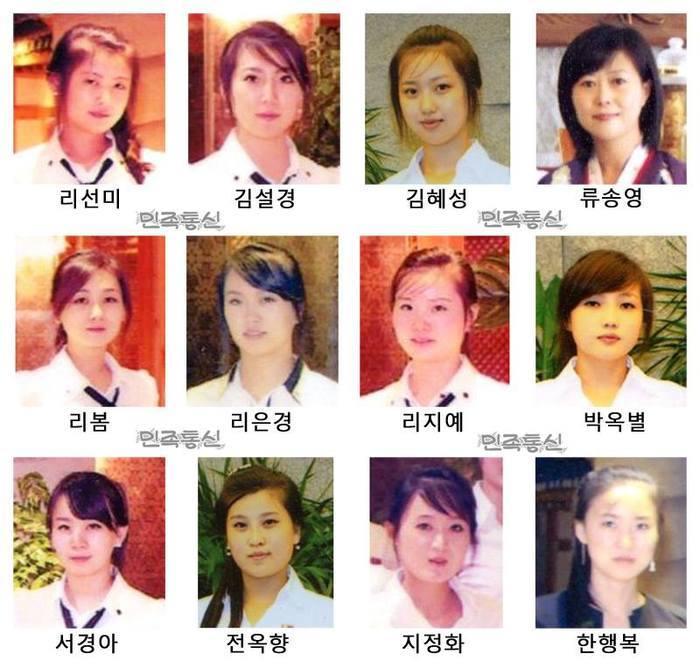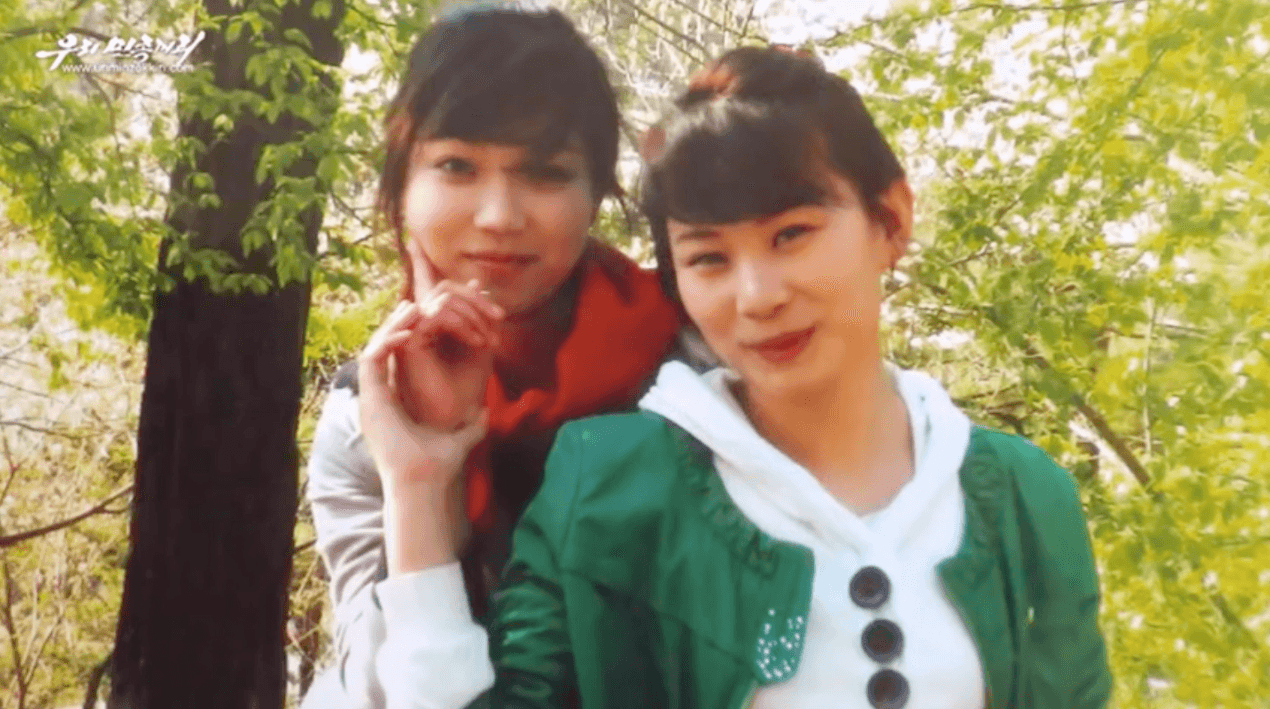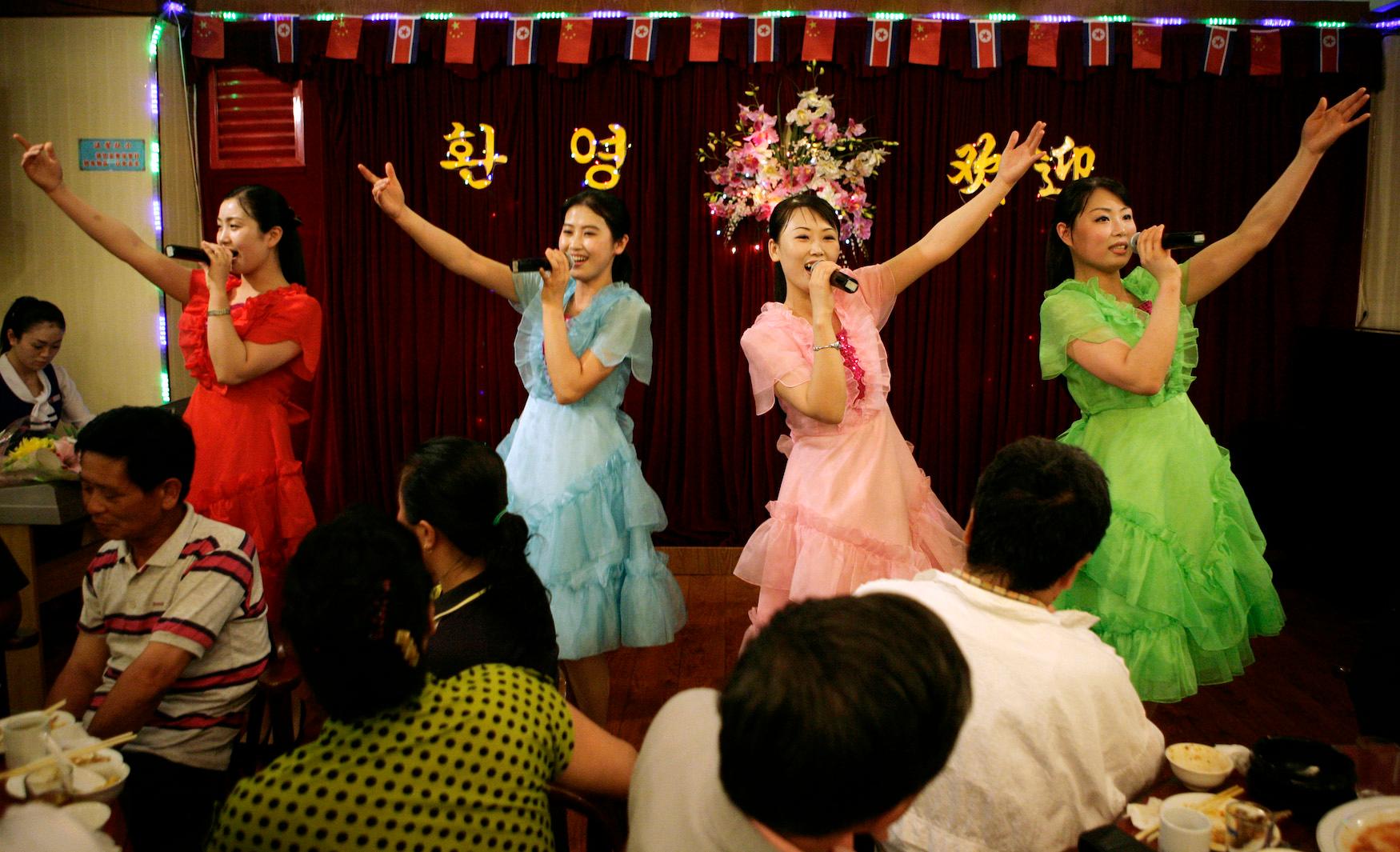Singing waitresses entertain crowds at a North Korean restaurant in the Chinese border city of Dandong, on May 28, 2009.
Update: New reports released by CNN suggest that the North Korean waitresses profiled in this story were, in fact, deceived into traveling to Seoul with the aid of South Korea’s foreign intelligence bureau. This lends credence to North Korean claims that the women were victims of an “abduction.”
There are perhaps no two nations more desperately in need of peace talks than North and South Korea.
Distant as this hope may seem, South Korea’s new president, Moon Jae-in, has staked his reputation on it. This son of North Korean refugees has spoken glowingly of a nuclear weapons-free peninsula, reunited as a single nation — its two halves fused just as East and West Germany became one.
South Korea, he says, must begin a series of collaborative steps that will lead its estranged sibling back from the “bridge of no return.” Step one: cooperate to briefly reunite Korean families split on opposite sides of the Demilitarized Zone.
Moon says this feel-good diplomacy is a “meaningful start” to a more serious conversation about peace. North Korea’s response? Forget about it — unless you send our 12 singing waitresses back home.
Yes, waitresses. Until recently, the women in question were waltzing, crooning hostesses. They worked at a constellation of overseas eateries that funnel cash to Kim Jong-un’s regime.
Now they are geopolitical pawns in a nuclear standoff.

Who are these waitresses?
Until April 2016, the women worked at a state-owned North Korean restaurant in Ningbo, China, a port city about 100 miles south of Shanghai.
There are more than 100 such restaurants scattered around the world, most of them in Asia.
The eateries’ star attraction: regime-trained women in resplendent costume, twirling while playing accordions. They jam out covers such as “Take Me Home, Country Roads” and serve up strong soju liquor and mediocre bibimbap, a hearty rice dish.
Above video of North Korean dancing waitresses at a restaurant in Bangkok, Thailand, in early 2016, by Patrick Winn.
The 12 women and their male manager are now in South Korea under the close supervision of South Korea’s National Intelligence Service, the nation’s CIA equivalent. All sides agree that they were shuttled from China to Malaysia to Seoul. But from there, the details are hotly disputed.
Seoul says these women defected after surreptitiously watching South Korean soap operas, which subverted their indoctrination and sowed fantasies of a better life.
The Kim regime insists they were duped by South Korean agents and spirited away against their will. And though North Korea lies as a matter of policy, this case is mired in so many odd details that its claim shouldn’t be dismissed out of hand.
Why is Asia’s most notorious regime running overseas restaurants?
North Korea is starved for cash, thanks in part to its Stalin-inspired, hyper-centralized economy and, of course, to crushing sanctions.
The country deploys about 50,000 citizens abroad to work a variety of jobs: mining, logging, construction — any sector that thrives on human toil. According to one United Nations estimate, this process brings in between $1 billion and $2 billion per year.
Kitschy restaurants featuring pirouetting female singers are one small sliver of this global enterprise.
How does the regime cultivate these performers?
Precise details are elusive. But women with experience inside North Korea’s rigid state-run performing arts training system can offer some insight.

“All musicians and performers in North Korea must have a round-shaped face and big eyes,” Han says. “Your voice must be high pitched and very clear.”
If a young girl meets these requirements — and hails from a family marked as allegiant — she may be shunted into a strenuous after-school training regimen and guided toward a performance career.
“But sometimes, as the girls age, they fail to meet the specifications,” Han says. “Maybe they don’t grow tall enough. Maybe their skills aren’t up to par. So the authorities will send them to the restaurants. That’s how they make use of not-so-talented people.”
How are women treated at these restaurants?
This is a matter of perspective. In some ways, their lives are more comfortable than, say, a typical Bangladeshi garment worker stitching shirts for Western brands. Yet they work under conditions that, if replicated in America or Europe, would land their bosses in prison.
The waitresses almost always live in a dorm located above the dining area or in a building nearby. Their ability to travel outside the immediate area is severely limited.
Each woman’s behavior is constantly monitored — both by a manager, who is typically male and free to punish workers as he pleases, and co-workers, who are raised to report all colleagues who betray state ideology.
“For any North Korean performer traveling abroad, the mental training is intense,” says Choi Myi Kyung, a former North Korean gymnast who was trusted by the government to travel abroad for competitions. (Choi defected in the early 2000s and now uses that name as a pseudonym.)
“They’ll put them into groups of three. Then, at night, they’ll have to hold self-criticism sessions,” she says. “Even when you go to the bathroom, you’ll have two other women standing right outside. You get used to it.”
But by North Korean standards, singing for foreigners is considered a high-status, cozy gig.
“No one has the freedom to travel around in North Korea. So why would they have that right in a foreign country?” Han says. “These are women from the high-middle or upper classes. They’re not miserable. People back in North Korea envy them.”
How did the waitresses vanish from the restaurant in China?
From China, the dozen waitresses were secretly escorted by their manager, a man named Heo Gang-il, to a nearby airport and flown to Malaysia on April 6, 2016. In Malaysia, they boarded a flight to South Korea, where they were received by the National Intelligence Service.
The circumstances surrounding this caper, however, are very slippery.

Various South Korean government statements contend that “they learned about the reality in South Korea through South Korean TV, soap operas, movies and internet” and that they “pushed ahead with the escape without any help from the outside.”
North Korea says they had plenty of help from the outside — namely South Korean agents. These spies allegedly collaborated with the manager to pull off what the North considers a kidnapping. Pyongyang officials contend that the manager coaxed the staff to cooperate with a lie. According to their allegations, he told the waitresses they’d be relocating to an eatery in Southeast Asia.
Not everyone came along for the ride. Seven female workers didn’t leave the restaurant. Perhaps they refused. Perhaps they were ditched. All we know is that they were quickly shuttled back to North Korea, where they were exalted as victims of America’s scheming “puppet regime” in South Korea.
Pyongyang has never wavered from its insistence that the disappearing waitresses are pious victims of nefarious plots.
Why doubt South Korea’s story?
The Ningbo 12 case is marked by unusual details.
Minbyun, a legal team also known as “Lawyers for a Democratic Society,” has collated the details. The team’s known for taking politically charged, pro bono cases that challenge the conservative establishment. (Moon, the new president, is a former member.)
“We’re trying to investigate the truth,” says Jang Kyung-uk, a Minbyun attorney. “We do believe this was an organized kidnapping by the South Korean intelligence services.”
They don’t have proof. But the lawyers, claiming to represent the North Korean families of the waitresses, believe they have significant circumstantial evidence.
After defecting southward, North Korean defectors usually stream into a resettlement center called Hanawon. There, they receive a crash course on daily life in South Korea, one of the most technologically superior nations on earth, along with heavy psychological training to strain out any lingering fondness for the Kim clan.
[[{“fid”:”181822″,”view_mode”:”default”,”type”:”media”,”link_text”:null,”field_deltas”:{},”attributes”:{“alt”:”North Koreans rally to express \”boiling and spreading” anger toward South Korea in October 2016, according to North Korean propaganda channels.”,”title”:”North Koreans rally to express \”boiling and spreading” anger toward South Korea in October 2016, according to North Korean propaganda channels.”,”height”:468,”width”:700,”class”:”media-element file-default”,”data-delta”:”4″},”fields”:{}}]]
After three months, they’re given citizenship and released into the population.
That’s not what happened to the Ningbo 12. They were pulled into a secretive months-long debriefing session run by intelligence services.
Since they’ve arrived in Seoul, the women have remained away from the public, the media and even the lawyers agitating on their behalf. “We can’t track them down,” Jang says, though they are believed to be split into small groups and living with one another.
Never before has such a large group of unrelated upper-class North Koreans decided to “defect” en masse — risking a black mark (or worse) upon their families back home.
“These women have proven very useful as propaganda,” Jang says. “The intelligence services want to show that even the upper classes in North Korea dream of South Korean society.”
Though this legal team can’t speak directly with the Ningbo 12, they have managed to gather intel on Heo, the manager. Late last year, he agreed to a four hour interview with one of their attorneys, Chae Hee-joon.
“Let’s just say the manager was a troublemaker,” says Chae, who is convinced the man was colluding with South Korean spies. “He never treated [the waitresses] as colleagues. He also called them saeggi,” a Korean word for baby animals. “It was a general-and-his-soldiers sort of relationship.”
What’s next for these women?
North Korea’s nuclear-weapons tests have become so outrageous that negotiations between the Koreas are an unlikely prospect in the near term.
Moon’s hopes for peace talks look dim — and they’re proving politically costly. Never mind that Moon is a former special forces paratrooper. His political rivals portray him as weak for pursuing negotiations. He’s even catching fire from US President Donald Trump, who has accused his government of “appeasement.”
Moon insists that “we have reached the tipping point of the vicious circle of military escalation — and thus the need for dialogue is more pressing than ever before.” North Korea, while mocking Moon’s offer as “riddled with sophistries,” has nevertheless noted that this softer touch is a “relief.”
Still, if tension dials back and negotiations become viable, the two nations are poised to stumble at the very first step: reuniting estranged families.
If South Korea ever agrees to Pyongyang’s ultimatum to return the waitresses, it will likely have to confront the puzzling circumstances that swept them over to Seoul.
Otherwise, North Korea is unlikely to budge.
“We will not cease our struggle,” the regime has warned. “If the south Korean authorities are truly interested in the issue of ‘separated families,’ they should settle the issue of repatriation of the women whom they put under detention in South Korea for absurd reasons.”
Patrick Winn reported in Seoul. Sona Jo, a filmmaker based in Seoul, contributed reporting to this story.
Related stories:
She once served in North Korea’s army. Now she thinks Trump is a ‘cool guy.’
What’s behind the restaurants North Korea runs around the world? Kitsch — and perhaps recordings.
Our coverage reaches millions each week, but only a small fraction of listeners contribute to sustain our program. We still need 224 more people to donate $100 or $10/monthly to unlock our $67,000 match. Will you help us get there today?
